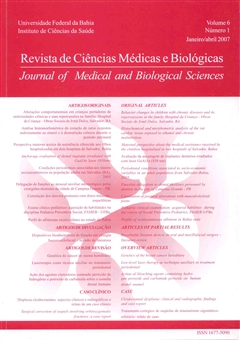Pediatric clinical examination: acquired habilities during the course of Social Preventive Pediatrics, FAMEB-UFBa
DOI:
https://doi.org/10.9771/cmbio.v6i1.4151Keywords:
Pediatrics - Education and learning, Medical pedagogyAbstract
This study analyzes the main difficulties and the acquired skilles of the medical students in the ambulatorial practice of Social Preventive Pediatrics Discipline, from the College of Medicine of Bahia - Federal University of Bahia - in their first contact with the pediatric clinic. The students were inquired about their main difficulties at the begining and at the end of the discipline, through a questionnaire, with the objective of identifying the acquired skills and the most hardly surpassed difficulties. This practical activity is characterized by the ambulatorial primary attendance, in which the pediatric consultation is performed, emphasizing a detailed interview and a complete physical examination, besides the peculiarities of each pediatric age group. As to the interview, the students demonstrated to be less secure on the analysis of growth and neuropsychomotor development; whereas on physical examination, a reduced self-confidence has been noted on abdominal and genital examination. A clear acquisition of skills was noted in the performance of the interview as well as of the physical examination, although in some variables this evolution was more evident.Downloads
Download data is not yet available.
Downloads
Published
2007-01-02
How to Cite
Ribeiro, L. A. P., Dias, C. P. F., Jesuíno, F. A., Alcântara, T. Q. N., Figueiredo, I. C., Sá, A. C. S., Bastos, C. M., Suñé, R. S., Belitardo, P. M. M., Oliveira, C. S., Santana, M. C., Casqueiro, J. B., Lopes, D. M. C., Adan, L. F., & Silva, L. R. (2007). Pediatric clinical examination: acquired habilities during the course of Social Preventive Pediatrics, FAMEB-UFBa. Journal of Medical and Biological Sciences, 6(1), 63–68. https://doi.org/10.9771/cmbio.v6i1.4151
Issue
Section
ORIGINAL ARTICLES
License
The Journal of Medical and Biological Sciences reserves all copyrights of published works, including translations, allowing, however, their subsequent reproduction as transcription, with proper citation of source, through the Creative Commons license. The periodical has free and free access.


